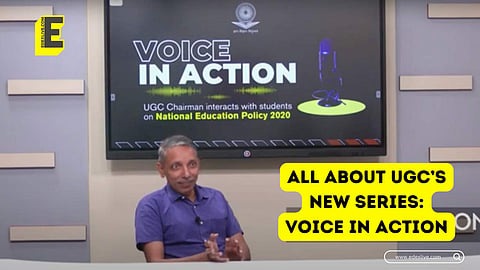

The University Grants Commission (UGC) has introduced a special series, Voice in Action, during which UGC Chairman Prof M Jagadesh Kumar conducts in-person discussions about various trending topics in the field of higher education in India with students from different parts of the country.
The very first episode of the series was released on UGC’s official YouTube handle today, Friday, October 13, 2023. In this informative first episode, Prof M Jagadesh Kumar spoke about various aspects of the National Education Policy (NEP) 2020 and thrust areas of higher education in India. He further discussed the challenges and opportunities for students in Indian higher education.
Here is a glimpse of a fun, casual and informal discussion between the students and the UGC chairman:
Indian Knowledge system: Good or bad?
One of the features that UGC has been pushing for under the new National Education Policy (NEP) 2020 is the Indian Knowledge System (IKS).
While there have been many critiques, both good and bad, debating the importance of this academic reform, the UGC chairman explained to the students how the Indian Knowledge System can benefit the education system.
“India has contributed in various disciplines. Be it medicine, be it architecture, be it law, be it social sciences and in many areas, for thousands of years, India has contributed immensely; like in yoga, ayurveda, astronomy, mathematics. Somehow, our younger generation has lost touch with this knowledge,” the chairman explained.
He went on to give several examples of Indian advancements to the students like the ancient Indian water management system, environment and ecological consciousness and so on.
“The Indian knowledge system can be studied together with contemporary knowledge to find solutions which are accessible to people across the world. Can we come up with solutions for many problems that we are facing?” he added.
Grievance redressal
During the conversation, students brought up the issue of lathe ck of a common and accessible grievance redressal in educational institutes.
In response to this, the UGC chairman said that the commission is striving to create a strong grievance redressal system across all higher education institutes in India.
“A few months ago, we introduced a new regulation making it mandatory for universities and colleges to establish a student grievance redressal committee. UGC has also introduced an online platform for grievance redressal where students can register complaints,” he said
He added that the commission is in talks with universities across the country to ensure that an ombudsperson is appointed to ensure a smooth grievance redressal system.
Why CUET?
Another point of discussion in the education sector lately has been the introduction of Cothe mmon University Entrance Test (CUET), a single exam for admissions into all central, as well as many state and private funded universities.
Explaining why CUET was introduced, the UGC chairman stressed that having a single exam for admissions into undergraduate (UG) and postgraduate (PG) courses across India provides fair opportunities to all students.
“There are 65 boards in our country and the evaluation is different across all boards. While in some boards it is easier to score 99 per cent, students cannot score 75 per cent with the same level of knowledge. Hence, to bring a level playing field, we introduced CUET," said Prof Kumar.
He even added that diversity has increased in universities after the introduction of CUET, boosting national integration.
Abhay Barwal, a student of Himachal Pradesh Technical University, also agreed with the benefits of a single exam.
"CUET is beneficial, unlike JEE or NEET, you do not require any advanced preparation for the exam. I appeared for CUET-PG to get admission into MSc and all the questions were from my BSc syllabus. So, a student can clear CUET without any coaching or online assistance," he said.
If you were vice-chancellor for a day…
In another interesting segment during the first episode of UGC's Voice in Action series, the students were asked to answer what reforms they would bring if they were made vice-chancellor of any university for a single day.
The question brought out a series of interesting responses from the students, revealing common grievances that students in India might be facing.
Akanksha Sharma, a student of Himachal Pradesh Technical University, pursuing his BTech in Computer Science, responded, " I would introduce latest technology like AI (Artificial Intelligence) into our curriculums”
Moreover, students added that they would bring reforms in the examination process across universities to make them more strict, revise the syllabi, introduce changes to admission criteria of universities, and ensure timely announcement of results.
The students also expressed that they would work on the interpersonal skills of college faculty and professors if they were made vice-chancellor for a day.
